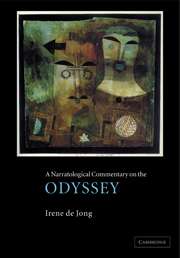Book contents
- Frontmatter
- Contents
- Preface
- Glossary
- Commentary
- Book One
- Book Two
- Book Three
- Book Four
- Book Five
- Book Six
- Book Seven
- Book Eight
- Book Nine
- Book Ten
- Book Eleven
- Book Twelve
- Book Thirteen
- Book Fourteen
- Book Fifteen
- Book Sixteen
- Book Seventeen
- Book Eighteen
- Book Nineteen
- Book Twenty
- Book Twenty-one
- Book Twenty-two
- Book Twenty-three
- Book Twenty-four
- Appendix A
- Appendix B
- Appendix C
- Appendix D
- Appendix E
- Appendix F
- Bibliography
- Index of Greek words
- Index of subjects
Book Thirteen
Published online by Cambridge University Press: 23 March 2010
- Frontmatter
- Contents
- Preface
- Glossary
- Commentary
- Book One
- Book Two
- Book Three
- Book Four
- Book Five
- Book Six
- Book Seven
- Book Eight
- Book Nine
- Book Ten
- Book Eleven
- Book Twelve
- Book Thirteen
- Book Fourteen
- Book Fifteen
- Book Sixteen
- Book Seventeen
- Book Eighteen
- Book Nineteen
- Book Twenty
- Book Twenty-one
- Book Twenty-two
- Book Twenty-three
- Book Twenty-four
- Appendix A
- Appendix B
- Appendix C
- Appendix D
- Appendix E
- Appendix F
- Bibliography
- Index of Greek words
- Index of subjects
Summary
Book 13 covers the thirty-fourth and part of the thirty-fifth day; cf. Appendix A. It brings Odysseus' departure from Scheria (18–80), a ‘seavoyage’ scene (81–92), ‘landing’ type-scene (93–124), Olympic scene (125–87), and the meeting between Athena and Odysseus, which is a combination of the ‘delayed recognition’ story-pattern (187–358) and a ‘god meets mortal’ scene (221–440).
We move from the sea to land, from fairytale countries to Ithaca (again), from Odysseus' external to his internal nostos, i.e., his reintegration into Ithacan society and his oikos as king, husband, father, and master of the house. Odysseus' meeting with Athena marks an upward turn in the hero's fortunes: instead of being persecuted by a god (Poseidon), he will be openly helped by one (Athena); instead of passively enduring his fate, he will actively decide that of others (the Suitors). Even though he still has much to endure, all takes place in the certainty of future revenge.
In the conversation with Athena lines are set out both for the second half of the Odyssey as a whole (Odysseus' revenge on the Suitors, to which the pace and manner of the reunions with his philoi are made subservient), and for the next three books (Odysseus' stay with Eumaeus in 14, Telemachus' return to Ithaca in 15, and the reunion of father and son at Eumaeus' place in 16).
- Type
- Chapter
- Information
- A Narratological Commentary on the Odyssey , pp. 313 - 339Publisher: Cambridge University PressPrint publication year: 2001



